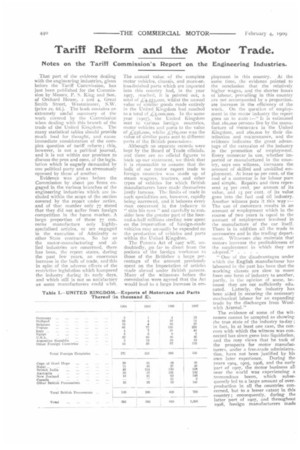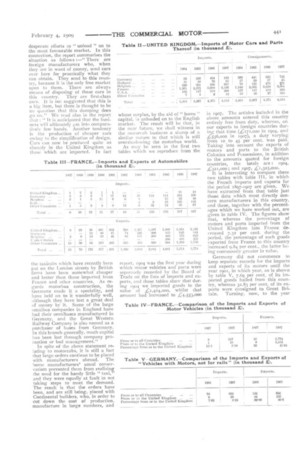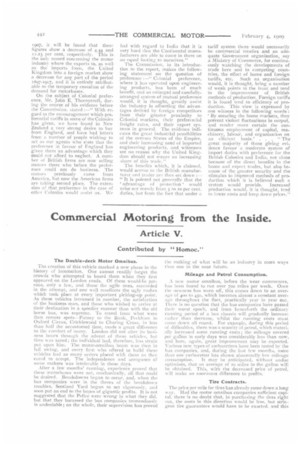Tariff Reform and the Motor Trade.
Page 2

Page 3

Page 4

If you've noticed an error in this article please click here to report it so we can fix it.
Notes on the Tariff Commission's Report on the Engineering Industries.
That part of the evidence dealing with the engineering industries, given before the Tariff Commission, has just been published for the Commission by Messrs, P. S. King and Son, of Orchard House, 2 and 4, Great Smith Street, 'Westminster, S.W. (price 25. 6d.). The book contains an extremely useful summary of the work covered by the Commission when dealing with this branch of the trade of the United Kingdom. The many statistical tables should provide much food for thought, and cause immediate consideration of the complex question of tariff reform ; this, however, is not a political journal, and it is not within our province to discuss the pros and cons, of the legislation which is eagerly demanded by one political party and as strenuously opposed by those of another.
Evidence was given before the Commission by about soo firms engaged in the various branches of the engineering industries which are included within the scope of the section covered by the report under notice, and of that number only 77 stated that they did not suffer from foreign competition in the home market. A large proportion of those 77 concerns manufacture only highlyspecialised articles, or are engaged in the execution of Admiralty or other State contracts. So far as the motor-manufacturing and allied industries are concerned, there has been, the report states, during the past few years, an enormous increase in the bulk of trade, and this in spite of the adverse effects of the restrictive legislation which hampered the industry during its early days, and which still is not so satisfactory as some manufacturers could wish.
The annual value of the complete motor vehicles, chassis, and more-orless-finished parts which are imported into this country had, in the year 1907, reached, it is pointed out, a total of ,44,553,000, whilst the annual value of similar goods made entirely in the United Kingdom had reached to a total of ;5,000,000. In the same year (1907), the United Kingdom sent to various foreign countries, motor vehicles and parts to the value of ,-556,000, whilst .4769,000 was the value of similar parts sent to different parts of the British possessions.
Although no separate records were kept by the Board of Trade officials, and there are no official figures to back up our statement, we think that it is reasonable to assume that the bulk of our motor export trade to foreign Countries was made up of steam wagons, tractors, and other iypes of vehicles for which British manufacturers have made themselves justly famous. The limits of trade in such specialities are, however, rapidly being narrowed, and it behoves every man concerned in the industry to " skin his eves " and carefully to consider how the greater part of the fourand-a-half millions sterling now spent on the importation of foreign-made vehicles may annually be expended on the production of vehicles and parts within the United Kingdom. The Patents Act of 1907 will, undoubtedly, go far to divert from the pockets of the foreign workman to those of the Britisher a large percentage of the amount previously spent on the importation of articles made abroad under British patents. Many of the witnesses before the commission were agreed that the Act would lead to a large increase in em
ployment in this country. At the same time, the evidence pointed to the conclusion that the relatively higher wages, and the shorter hours of labour, prevailing in this country are not accompanied by a proportionate increase in the efficiency of the work. On the question of employment in the motor industry the report goes on to state :—" It is estimated that 16o,000 persons live by the manufacture of motorcars in the United Kingdom, and 260,000 by their distribution and maintenance, and the evidence indicates the great advantage of the extension of the industry in the promotion of employment. Every motorcar in use, whether imported or manufactured in the country, says one witness, increases the amount of skilled and unskilled employment. At lease 90 per cent, of the cost of a motorcar is for labour pure and simple. Repairs and tires represent 25 per cent, per annum of its value, and 15 per cent. of its value goes into the fuel and oil industry. Another witness puts it this way :The use of motorcars results in an amount of employment which in the course of two years is equal to the amount of employment involved in the manufacture of the car itself. There is in addition all the trade in accessories and in the trading department. Witnesses also maintain that motors increase the profitableness of the employment in which they are adopted." . . • .
" One of the disadvantages under which the English manufacturer has laboured in the past has been that the working classes are slow to move from one form of industry to another, partly, in the opinion of some, because they are not sufficiently educated. Latterly, the industry has been aided in securing the necessary mechanical labour for an expanding trade by the discharges from Woolwich Arsenal."
The evidence of some of the witnesses cannot be accepted as showing the true state of the industry to-day ; in fact, in at least one case, the concern with which the witness was connected has since gone into liquidation,
and the rosy views that he took of the prospects for motor manufac turers, under a free-trade administra tion, have not been justified by his own later experience. During the years 1904, /905, 1906, and the early part of 1907, the motor business all over the world was experiencing a tremendous boom, which subse quently led to a large amount of overproduction in all the countries con cerned, but to a lesser extent in this country; consequently, during the latter part of igo7, and throughout t908, foreign manufacturers made desperate efforts to "unload " on to the most favourable market. In this connection, the report summarises the situation as follows :—" There are foreign manufacturers who, when they are in want of money, send cars over here for practically what they can obtain. They send to this country, because it is the only free market open to them. There are always means of disposing of these cars in this country. They are first-class cars. It is not suggested that this is a big item, but there is thought to be no question that this dumping does go on." We read also in the report that : "It is anticipated that the business will ultimately get into comparatively few hands. Another tendency is the production of cheaper cars owing to the simplification of design. Cars can now be produced quite as cheaply in the United Kingdom as those which are imported. In fact the taxicabs which have recently been put on the London streets by British firms have been somewhat cheaper and better than those imported from France and other countries. As regards motorbus construction, the Germans made it a speciality, and have held on to it wonderfully well, although they have lost a great deal of money by it. Some of the large omnibus companies in England have had their omnibuses manufactured in Germany, and the Great Western Railway Company is also named as a purchaser of buses from Germany. In this branch generally, much capital has been lost through company promotion or bad management."
In spite of the above statement relating to motorcabs, it is still a fact that large orders continue to be placed with manufacturers abroad, The home manufacturers' usual conservatism prevented them from realising the need for the handy little "taxi," and they were equally at fault in not taking steps to meet the demand. The result is that the orders have been, and are still being, placed with Continental builders, who, in order to cut down the cost of production, manufacture in large numbers, and whose surplus, by the aid of " home" capital, is unloaded on to the English market. The result will be that, in the near future, we shall witness in the motorcab business a slump of a similar nature to that which is still overshadowing the motorbus world. As may be seen in the first two tables which we reproduce from the report, 1904 was the first year during which motor vehicles and parts were separately recorded by the Board of Trade on the lists of imports and exports, and these tables show that during 191)4 we imporied goods to the value of L:2,424,000, whilst that amount had increased to 474,553,000
in 1907. The articles included in the above amounts entered this country entirely free from duty, whereas, on our exports to foreign countries during that time (..575,000 in 5904, and 4556,000 in 19(37), a duty varying from lia to 45 per cent, was paid. Taking into account the exports of motors and parts to the British Colonies and Possessions, in addition to the amounts quoted for foreign countries, the totals are : 1904, Z'321,000; and 5907, .4;1,325,000. It is interesting to compare these two tables with table HI, in which the French imports and exports for the period 5897-1907 are given. We have extracted from that table just those data which most directly concern manufacturers in this country, and these, together with the percentages which we have worked out, are given in table IV. The figures show that, whereas the percentage of motors and parts imported from the United Kingdom into France decreased 7.32 per cent. during the period, the percentage of such goods exported from France to this country increased 9.84 per cent., the latter being enormously greater in value.
Germany did not commence to keep separate records for the imports and exports of its motors until the year liaot, in which year, as is shown by table V, 7.69 per cent, of its imported goods hailed from this country, whereas 32.83 per cent, of its exports were consigned to Great Britain. Turning, now, to the year
1907, it will be found that these figures show a decrease of 4.44 and 12.23 per cent. respectively. This is the only record concerning the motor industry where the exports to, as well as the imports from, the United Kingdom into a foreign market show a decrease for any part cf the period 1897-19o7, and it is entirely attributable to the temporary cessation of the demand for motorbuses.
On the subject of Colonial preference, Mr. John E. Thornycroft, during the course of his evidence before the Commission. stated :—" With regard to the encouragement which preferential tariffs in some of the Colonies has given, we have found in New Zealand a very strong desire to buy from England, and have had letters from a number of people wishing to act as our agents who state that the preference in favour of England has given them an advantage which they could not afford to neglect. A number of British firms are now selling motors there who before the preference could not do business. The motors previously came from America, hut now the American firms are taking second place. The extension of that preference in the case of other Colonies would assist us. We feel with regard to India that it is very hard that the Continental manufacturers are able to come in there on an equal footing to ourselves."
The Commission, in its introduction to the report, makes the following statement on the question of
preference :—" Colonial preference, where it has operated upon engineering products, has been of much benefit, and an enlarged and carefullyarranged system of mutual preference would, it is thought, greatly assist the industry in offsetting the advantages derived by foreign competitors from their greater proximity to Colonial markets, their preferential freight rates, and their export systems in general. The evidence indicates the great industrial possibilities of the oversea States of the Empire, and their increasing need of imported engineering products, and witnesses see no reason why the United Kingdom should not secure an increasing share of this trade."
The benefits which, it is claimed, would accrue to he British manufacturer and trader are thus set down :— " It is pointed out generally that the ' advantage of protection ' would arise not merely from 5 to to per cent. duties, but from the fact that under a tariff system there would necessarily be commercial treaties and an adequate Government organisation, say a Ministry of Commerce, for continuously watching the developments of trade here and in competing countries, the effect of home and foreign tariffs, etc. Such an organisation would, it is thought, bring a number of weak points to the front and tend to the improvement of British methods of production. Foreign tariffs it is found tend to efficiency of production. This view is expressed by one witness in the following words : ' By securing the home markets, they prevent violent fluctuations in output, and render more certain the continuous employment of capital, machinery, labour, and organisation on
an efficient . . . The great majority of those giving evidence favour a moderate system of import duties with preference for the British Colonies and India, not alone because of the direct benefits in the home and export trades, but also because of the greater security and the stimulus to improved methods of production which it is believed such a system would provide. Increased production would, it is thought, tend to lower costs and keep down prices."






















